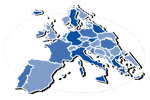|
|
|
|
|
|
copyright 2002 by the ARTS Consortium. ARTS is a project within the fifth framework programme of the European Union - competitive and sustainal growth.
|
|
|

|
 Organisational Barriers cover all barriers with an organisational dimension which result in problems and obstacles in the design/planning and implementation process for new and more flexible transport services. On the one hand, organisational barriers may include limits to organisationsí jurisdictions in terms of administrative areas and territories, their responsibility for public transport Organisational Barriers cover all barriers with an organisational dimension which result in problems and obstacles in the design/planning and implementation process for new and more flexible transport services. On the one hand, organisational barriers may include limits to organisationsí jurisdictions in terms of administrative areas and territories, their responsibility for public transport
supply in rural areas and co-operation between these organisations. On the other hand, barriers in this Framework Category cover all barriers resulting from the resources of the operator (technological, capacity and experience) as well as the potential users (information, means of accessing information and communication). The co-ordination of different fare systems is a further important issue for discussion in this context. |
>> Public Institutions
>> Transport Operator
>> Information and Communication
>> Technical Support
|

|
|
Lack of co-operation between the responsible authorities has been observed in almost every country. The absence of co-operation is felt to be a fundamental barrier in most EU countries, but the majority of the Eastern Accession Countries, although they observe similar circumstances, do not describe them as a source of problems. Lack of co-operation has been identified at and between all levels, between different public authorities, between public authorities and commercial as well as non-commercial entities, often with the result that current regular transport services have not been developed optimally. The development and implementation of transport services capable of serving rural areas in an improved manner by combining different transport systems and travel purposes is even more difficult to manage because of complex and often ambiguous allocation of responsibilities.Lack of interest in changing existing situations and lack of professional knowledge of public transport issues within public authorities are further barriers transport operators have to deal with.
|

>> Finland
>> Hungary
|



|
| If you want to know more about this Barrier and how to overcome it, please feel free to download our Handbook. |

|
|
|
|
|

